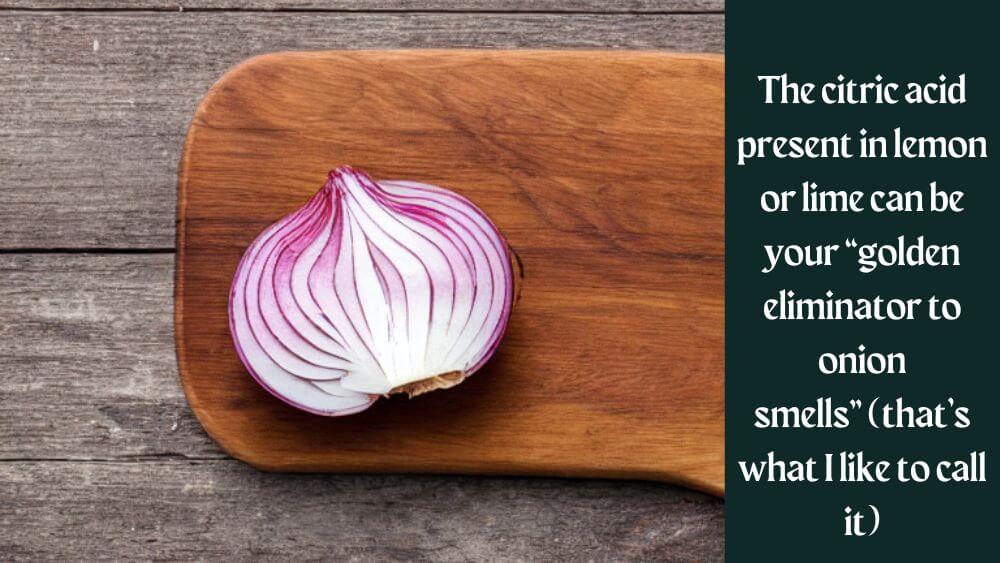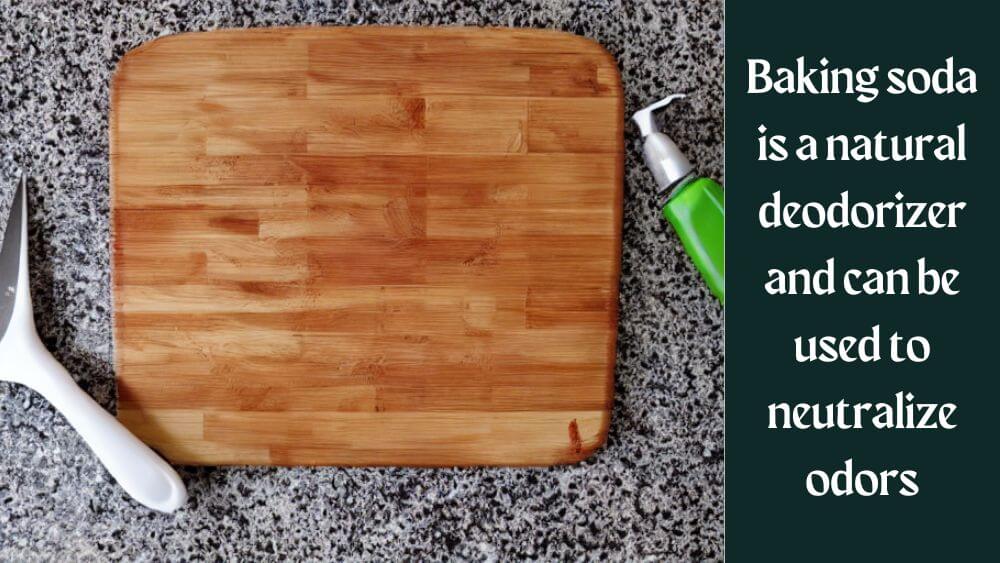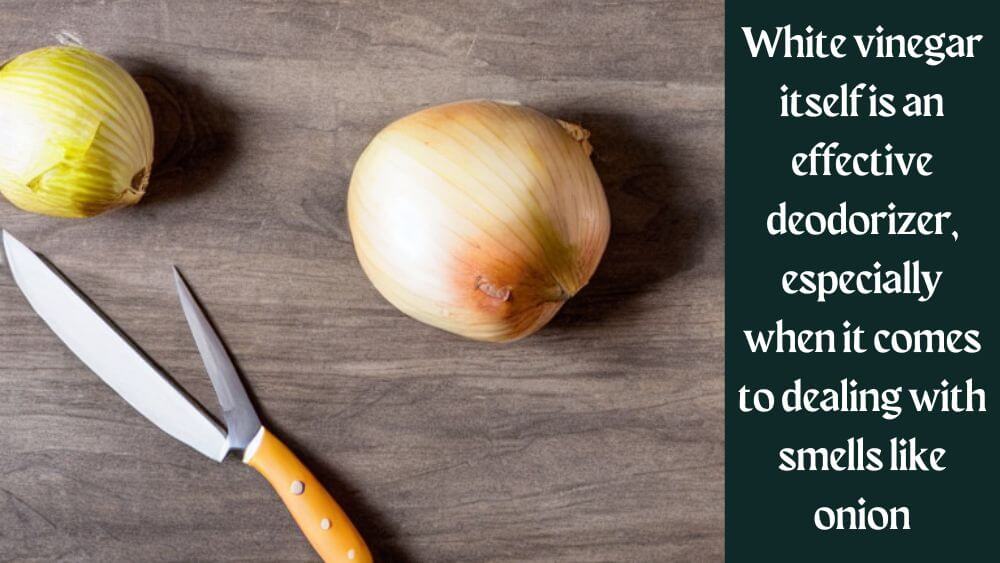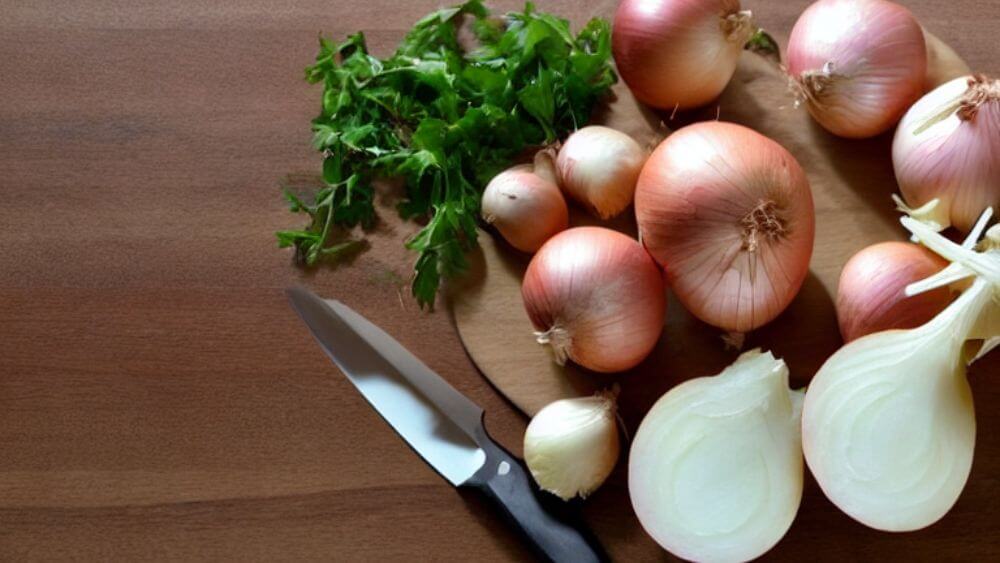If you’re here, then I can bet you already know how “painful” and “annoying” onion smells can be, especially when the smell is fixated on your cutting board for a long time.
Now, you must’ve tried several ways to get rid of those strong “onion smells,” but nothing seemed to work. Well, no worries! Here I’ll let you know the “sure-shot” ways how to get rid of the onion smell from cutting board without even sweating.
All you got to do is binge until the end of this blog, and I can assure you that you’ll have no smelly cutting boards once and for all!
You’ll Learn
- How to get rid of the onion smell from the cutting board, depending on the material
- Which cutting board type tends to be less smelly

Step-by-Step Process to Get Rid of Onion Smell from Cutting Board
Here in this section, you’ll get a step-wise guide through which you can easily and most effectively deal with those “nose-shattering” onion smells. So, don’t even try to skip any of the steps as this can cost you a big time!
Step 1: Scrub with Baking Soda
Baking soda is a natural deodorizer and can be used to neutralize odors. Sprinkle baking soda on the cutting board and use a scrub brush to thoroughly brush it. Leave it for a few minutes to absorb any odors, then rinse the cutting board with water.
Step 2: Use White Vinegar
White vinegar itself is an effective deodorizer, especially when it comes to dealing with smells like onion. All you got to do is simply pour a small amount of white vinegar on the cutting board and then use your scrubbing brush. Leave it for a few minutes, then rinse your entire cutting board with water.
Experts’ Tip: I would recommend that you rinse at least twice, as this can deal with the smell better (personal preference, actually!).
Step 3: Use Lemon or Lime
The citric acid present in lemon or lime can be your “golden eliminator to onion smells” (that’s what I like to call it). It helps to neutralize odors, and using it appropriately will ensure the smells are gone for good. Just cut a lemon (or lime) in half and use it to scrub the cutting board. Finally, rinse it thoroughly with water.
Step 4: Use Hydrogen Peroxide
Hydrogen peroxide is a natural bleach that can remove stains and odors. Mix equal amounts of water and hydrogen peroxide in a spray bottle and spray it on the cutting board. Leave it for 5-10 minutes, scrub it with a brush, and as usual, rinse it thoroughly!
Step 5: Leave it Out in the Sun
The sun’s rays can help to neutralize odors too. All you have to do is leave the cutting board in the sun for a few hours. And you would magically see that the smell is completely gone.
Step 6: Store in Airtight Container
Smells spread fast! And when it’s “onion smells,” it just appears to spread even faster! So, ensure to store the cutting board in an airtight container to avoid any odor or smell spreading to other kitchen items (trust me, that’s the last thing you would ever want to happen).
Step 7: Clean Frequently
To avoid the build-up of onion smell, make a habit of cleaning your cutting board frequently.
It’s important to note that some cutting boards, such as bamboo and plastic, may absorb odors more easily than others, like wood and glass. However, if your cutting board has a strong onion smell, it doesn’t go away in any way possible. Then the only solution you have is to get the board replaced.
Following these steps, you can eliminate the onion smell from cutting boards and keep your kitchen smelling fresh. Remember to clean your cutting board frequently and store it in an airtight container to prevent odors from building up in the future.

Which Type of Cutting Board Tend To Be ‘Less-Smelly’?
Having a cutting board that leaves less odor as you cut veggies, especially onions, can save time in the first place. I personally prefer getting the right type of cutting board in such cases. Below are the cutting board types that tend to leave “less” smell.
Wooden and Bamboo Cutting Boards
They are pretty durable, easy to clean, and have a natural look that adds elegance to any kitchen. However, one of the downsides of wooden and bamboo cutting boards is that they are porous.
This means that they can absorb liquids and odors. Well, it can be a problem when cutting onions and other strong-smelling foods. Once the odor is absorbed, it can be difficult to remove it. And the cutting board may continue to smell even after it has been washed.
Plastic Cutting Boards
However, plastic cutting boards are made from a non-porous material. For which they don’t absorb liquids or odors. This makes them a great choice, probably the best choice, for cutting onions and other strong-smelling items.
Needless to say, plastic cutting boards are super easy to clean and can be washed in a dishwasher, which can help to remove any lingering odors. They also come in various colors, so you can easily choose one that matches your kitchen decor.
Glass Cutting Boards
Well, glass boards are also non-porous. However, they’re not as popular as plastic cutting boards as they’re a bit brittle, heavy, and slippery. So, there’s always a risk of cracks and breaks.
So, plastic boards are, without question, the best choice if you want to cut onions without worrying about the smells.

Frequently Asked Questions
What is the easiest way to remove onion smell from my cutting board?
You can try scrubbing the board with a mixture of baking soda and lemon juice or vinegar. Rinse with water and let it air dry.
Can I use soap to clean the onion smell from my cutting board?
Yes, you can use soap and hot water to clean the board. However, if the odor is strong, try the baking soda and lemon juice mixture mentioned above.
How often should I clean my cutting board to prevent the onion smell?
We recommend cleaning your cutting board after every use, especially after cutting strong-smelling foods such as onions. It will prevent the buildup of odor and keep your cutting board fresh and odor-free. Give your cutting board a deep clean once a week if you use it frequently.
Can I use bleach to remove the onion smell from my cutting board?
Yes, you can use a mixture of bleach and water to clean the board. However, you should rinse thoroughly and air dry to prevent any residue from being left behind.
Can the onion smell come back even after I clean my cutting board?
Yes, the onion smell can come back if the board is not thoroughly cleaned or needs to be properly stored. Regular cleaning and proper storage can help prevent this from happening.
Wrapping Up!
So, after going through this blog, you should now know all the ins and outs of how to get rid of onion smell from cutting board. Moreover, you should also remember that the type of cutting board you pick also has its share of play with smells. So, if you want zero onion smells from your board, then plastic cutting boards can be a striking pick for you.

As the chief content writer, Hassan Al Sarker works as a professional kitchen-based content creator at Kitchen Liker.
In addition to reviewing the content published on Kitchen Liker, he ensures that it is accurate, relevant, and helpful. As a result, all the reviews and information published at Kitchen Liker are neutral and userfriendly.
Hassan Al Sarker has a bachelor’s degree in Hotel and Tourism Management From the Newyork University. Before joining Kitchen Liker, he was a contributor at Kitchen Club, United States.

